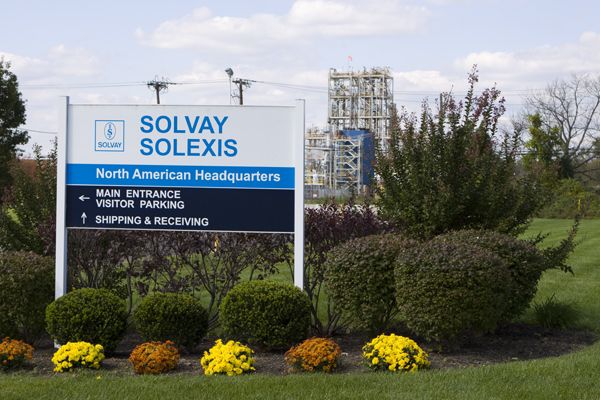Institute Rejects Industry Attempt to “Manufacture Doubt”
Strong Leadership by Chairman Cooper Stresses Science and Independence From Christie Executive Order
In an extraordinarily contentious meeting, yesterday the NJ Drinking Water Quality Institute (DWQI) rejected chemical industry arguments and adopted a recommendation to Gov. Christie’s DEP Commissioner Bob Martin to adopt a Maximum Contaminant Level (MLC) for PFNA of 13 ng/L.
DEP sampling has found the highest PFNA levels in the world in NJ drinking water (in Paulsboro, NJ, near the Solvay Solexis plant) and the Delaware River.
The DWQI 13 ng/L recommended MCL is the lowest in the United States. While there is insufficient human health effects data available to establish a cause and effect relationship, studies suggest that PFNA poses significant health risks, including reproductive and developmental impacts on children. Due to a lack of adequate human health data, animal studies were used as the basis of the DWQI recommendation.
In a prior post, I criticized DWQI Chairman Dr. Keith Cooper, suggesting that he was knowingly avoiding an essential scientific debate and insinuated that he might lack either the courage or integrity to defend the science and make tough decisions. I wrote:
As a scientist and an academic toxicologist, Rutgers professor Keith Cooper, PhD, Gov. Christie’s newly installed Chairman of the NJ Drinking Water Quality Institute (DWQI), certainly must be familiar with the compelling arguments of Professor David Michaels’ book “Doubt is their product – How Industry’s Assault on Science Threatens Your Health” and with Harvard Professor’s Naomi Oreskes’ work “Merchants of doubt – How a handful of scientists obscured the truth – from tobacco smoke to global warming“.
Both recent books amply document how corporate “scientists” have blocked, delayed, and weakened government’s attempts to regulate the public health and environmental risk of their products. […]
With Hal Bozarth, head of the NJ Chemistry Council sitting in the front row, of course Dr. Cooper did not want to talk about the fact that the chemical industry, including NJ based Dupont, is waging a war on his science and the work of the DWQI.
Of course he didn’t want to talk about “manufacturing uncertainty”.
I was dead wrong and I want to apologize to Dr. Cooper.
But, I also wrote that the chemical industry was engaged in a war on DWQI science and was pursuing a classic strategy to “manufacture doubt” in order to derail, delay, and weaken the DWQI’s efforts to make science based recommendations.
In that regard, I was absolutely correct and perfectly predicted the arguments of the chemical industry that were expressed at yesterday’s meeting.
A toxicological consultant for Solvay Solexis deployed a classic “manufacturing doubt” strategy, by stating (verbatim):
Available scientific evidence is not sufficient for regulatory decision-making … There is no evidence that PFNA causes toxicity in humans. … It is premature to regulate. …
The proposed MCL is based on an unprecedented uncertainty factor of 300,000 … we don’t know enough .. The recommendation is driven by uncertainty and assumptions, not toxicity data.
(see also: Chemical Industry Mounting Behind the Scenes Attack on Drinking Water Protections).
Cooper began yesterday’s meeting by clarifying the DWQI’s role, distinguishing it from DEP’s regulatory role, and emphasizing that the DWQI was not subject to Gov. Christie’s Executive Order #2 (cost benefit analysis, regulatory relief, et al) and would base recommendations on the science and mandate established by the Legislature in NJ’s Safe Drinking Water Act.
Cooper did this to reject the chemical industry’s argument that they failed to comply with EO#2. In a prior post, I analyzed that debate, see:
After a toxicological consultant for Solvay Solexis, the source of the high level PFNA contamination in Paulsboro, criticized the DWQI scientific analysis and recommendation, in a virtually unprecedented move, Dr. Cooper aggressively engaged the debate, defended the DWQI analysis, rejected her arguments, and limited her time.
WHAM! A total smack down of the chemical industry’s arguments on all grounds!
Cooper’s leadership was also an implied rejection of DEP Commissioner Martin’s criticism of prior DWQI science as “shoddy”.
Commissioner Martin testified to the legislature that DEP DWQI science was:
“shoddy, poor, not organized, and anecdotal” and that “there was little data and science to back it up”
That was always a load a crap so I salute Dr. Cooper in his aggressive defense of DWQI scientists.
Cooper pledged to submit the DWQI’s recommendation in a Report to DEP Commissioner Martin in no more than 2 weeks.
The ball will then formally be in DEP’s court.
Because Gov. Christie’ EO#2 “regulatory relief” policy and because DEP Commissioner Martin has ignored prior DWQI recommendations for almost 6 years, it will take strong public pressure, backed by media and legislative oversight, to get Martin to actually propose a MCL regulation to implement the DWQI’s recommendation.
However, it may be more difficult for Martin to sandbag the DWQI’s PFNA recommendation, because the DWQI was “acting at the direction of Commissioner Martin“, as the DWQI noted yesterday.
More to follow on this set of issues.


Pingback: public address transmitter software
Pingback: NFL Jerseys From China
Pingback: black ray ban aviators
Pingback: fc liverpool trikot sponsor
Pingback: 18650 Battery
Pingback: clock spec info
Pingback: camiseta real madrid manga larga ni?o
Pingback: their explanation
Pingback: trikot manuel neuer bayern
Pingback: camiseta retro argentina 1986
Pingback: read more info here
Pingback: Simon Flashlight
Pingback: prescription ray bans uk
Pingback: フェンディ アウトレットモール
Pingback: synchronized clocks for hospitals
Pingback: chelsea warren new jersey
Pingback: nueva camiseta de barcelona guayaquil 2014
Pingback: this page
Pingback: em trikot 2014 deutschland
Pingback: polo outlet
Pingback: their website
Pingback: cheap jerseys
Pingback: cheap ray ban wayfarer
Pingback: england new home shirt
Pingback: barcelona 2014 kit sports direct
Pingback: camiseta negra real madrid bogota
Pingback: neue trikots dortmund 2012
Pingback: camiseta real madrid negra james
Pingback: manchester united third kit 2012